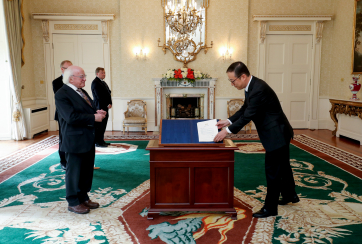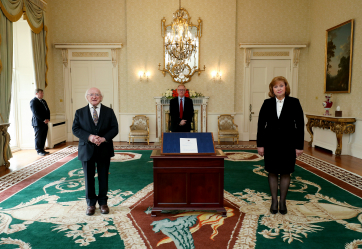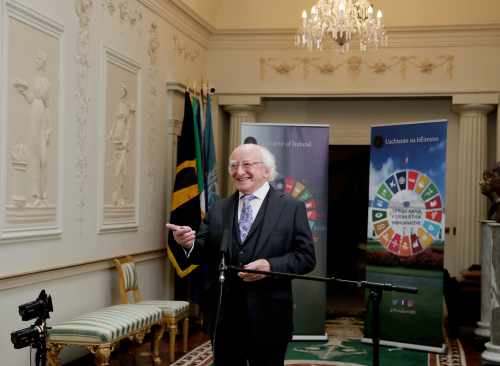“The Challenge of a Lifetime: Ensuring Universal Access to COVID-19 Health Technologies” Speech by President of Ireland, Michael D. Higgins
High-Level Virtual Event at the 75th Session of the United Nations General Assembly Friday, 25th September, 2020
Dear friends,
May I thank His Excellency Carlos Alvarado Quesada for the invitation to address you at this important high-level event, hosted by the President of Costa Rica and the World Health Organisation.
I am so pleased that how best to respond to COVID-19 is being discussed with urgency today, and I congratulate Costa Rica and the WHO for their call for action with conviction guided by the principle of universalism.
Today’s event, which coincides with the United Nations’ 75th General Assembly, represents a clarion call to Member States of the World Health Organisation, inter-governmental and non-governmental organisations, and other key stakeholders, to work towards ensuring the open knowledge exchange needed to develop the appropriate health tools to combat COVID-19.
This pandemic has demonstrated, with often tragic consequences, that new ideas are now required, ideas based on equity of access, sufficiency, sustainability. It has demonstrated an unequivocal need for a new eco-social political economy, of having universal basic services that will protect us in the future, of enabling people to achieve sufficiency in what they need.
As President of Ireland I am pleased that Ireland is among 156 countries that have joined a programme backed by the World Health Organisation, which aims to ensure the equitable distribution of any future vaccine against COVID-19. The COVAX scheme hopes to acquire two billion doses of safe and effective vaccines by the end of 2021, with healthcare workers prioritised initially and then the most vulnerable 20 percent of people in every participating country, regardless of income level.
The possibility of safe, effective and affordable diagnostics, therapeutics and vaccines provides vital hope of overcoming COVID-19, but unless such medical tools are fully accessible to all on an equitable basis, the world remains at risk. Unequal responses to the pandemic will widen inequalities already exacerbated by the impact of COVID-19. We must recognise the damage of inequality. Inequality must be addressed.
The Sustainable Development Goals can only be realised, we must remind ourselves, with strong global partnerships and cooperation. A multilateral approach to COVID health challenges will be a powerful contribution to the realisation of Goal 17 in particular – “To Revitalise the Global Partnership for Sustainable Development”.
COVID-19 is a global problem, and thus requires a global response. A realisation now exists that societies differ in their capacity to respond, such as those societies in Africa and Latin America who are in a more perilous position in terms of resources that might be utilised in responding to COVID-19. While the pandemic is a global threat, the most vulnerable are most at risk.
The World Health Organisation’s Dr. Mike Ryan frequently reminds us that “no-one is safe until everyone is safe.” There is, thus, a moral imperative to working together, in a spirit of collective ingenuity.
The only effective, enduring, sustainable approach to healthcare provision is one founded on real multilateralism and solidarity that enables us all to be ethical partners in the necessary structural change that can deliver universal access to COVID health discoveries. For those of us who believe in global social justice, we place so much collective hope on its advancement.
The “Solidarity Call to Action”, promoted by the WHO and the Government of Costa Rica, promotes the notion of safe, effective technologies against COVID-19 as global public goods, and urges key stakeholders to commit to undertaking the necessary actions “to realise equitable global access to these technologies through pooling of knowledge, intellectual property and data.”
As traditional markets have acknowledged that they cannot deliver at the scale needed to cover the entire globe, solidarity within and between countries and the private sector is essential if we are to overcome challenges presented to us by COVID with regard to accessing appropriate medical treatments.
I do want to applaud those med-tech companies that are already leading the way in this regard, allowing open access to their medical devices and innovations. This is global corporate social responsibility at its best.
Solidarity among nations is key if we are to optimise the world’s management and eventual exit from this pandemic. Today’s event is a call to action to Member States, academia, business, research institutions and agencies, based on global social responsibility, to encourage more global, non-exclusive voluntary licensing.
Our citizens must be able and encouraged to see themselves in the space of the vulnerability of each other. Solidarity requires, too, our understanding of the different kinds of vulnerability, as well as differences in capacities and circumstances.
The WHO’s Director-General Dr. Tedros Adhanom Ghebreyesus has said that, “The virus thrives on division but is thwarted when we unite.” His insight echoes an ancient Irish proverb, ní neart go cur le chéile, (there is strength in unity) – and work together we must.
Thank you. Gracias.
Beir beannacht.



